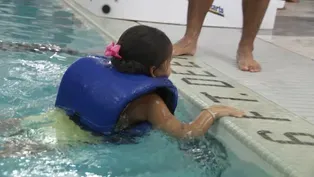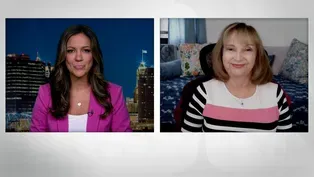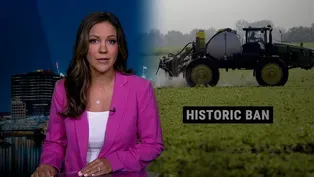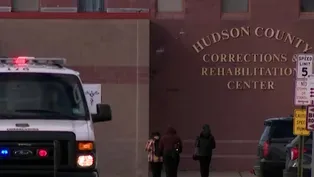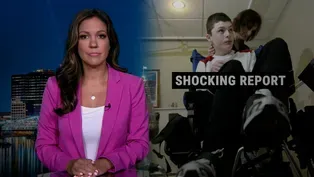NJ Spotlight News
NJ watchdog says residents with disabilities face abuse
Clip: 8/12/2024 | 7m 57sVideo has Closed Captions
New report details troubles, focuses on key areas where progress has stalled
New Jersey's Ombudsman for Individuals with Intellectual or Developmental Disabilities and Their Families is making an urgent plea on behalf of the state's most vulnerable residents. In a new report from the office paints a stark picture of systemic faults and policies that have failed far too many people. A lack of oversight enabled continued abuse at state-run homes, the report says.
Problems with Closed Captions? Closed Captioning Feedback
Problems with Closed Captions? Closed Captioning Feedback
NJ Spotlight News is a local public television program presented by THIRTEEN PBS
NJ Spotlight News
NJ watchdog says residents with disabilities face abuse
Clip: 8/12/2024 | 7m 57sVideo has Closed Captions
New Jersey's Ombudsman for Individuals with Intellectual or Developmental Disabilities and Their Families is making an urgent plea on behalf of the state's most vulnerable residents. In a new report from the office paints a stark picture of systemic faults and policies that have failed far too many people. A lack of oversight enabled continued abuse at state-run homes, the report says.
Problems with Closed Captions? Closed Captioning Feedback
How to Watch NJ Spotlight News
NJ Spotlight News is available to stream on pbs.org and the free PBS App, available on iPhone, Apple TV, Android TV, Android smartphones, Amazon Fire TV, Amazon Fire Tablet, Roku, Samsung Smart TV, and Vizio.
Providing Support for PBS.org
Learn Moreabout PBS online sponsorshipwe begin with an urgent call for reform on behalf of New Jersey's most vulnerable residents a new report paints a stark picture of systemic failures within the state that are hurting the thousands of individuals here with intellectual and developmental disabilities it details a lack of oversight enabling continued abuse at state-run homes along with too few supports blocked by walls of bureaucracy to help those residents and their families but perhaps the most shocking is the lack of progress by leadership at all state levels to hold agencies accountable when they've aired or to install checks and balances on the millions of taxpayer dollars that flow to these state license facilities many of the recommendations made by Paul Aronsohn the New Jersey Ombudsman for intellectual and developmental disabilities and their families have been made year after year he joins me now to talk about the most severe among them Paul thanks for coming in to talk about this report because you say it's a call to action for some of the most severe persistent challenges facing the lives of these residents what are they can you lay them out for us well first of all let me tell you just a little bit about our office by the nature of our office the folks that come to us for assistant usually are ones that are have a time-sensitive situation they're in crisis there's a problem so we're not you know those you're not getting the calls when things are uh sunny and Rosy right we get it right so we get folks that are that are in moments of need uh and what we do you know and we've sort of outlined this in our reports is we get daily calls and conversations about abuse and neglect in congrate living settings for children as well as adults we work with families that have severe autism that's autism with severe challenging Behavior self-injurious behaviors aggressive behaviors uh children again as well as adults we work closely with folks that have medical complexities that are not being met there no supports no private dirty nursing or what other medical needs they have are not being met and so those are the folks that we're dealing with on a daily basis so when you look at that would you say abuse and neglect is still by and large the biggest issue that's being brought to your attention yeah I I would definitely say that uh and again I can't quantify I I've always pointed this out in our report I can't quantify how much you know what percentage of the folks are are being you know uh experiencing abuse and neglect but I can tell you daily these are the families these are the individuals that we're working with most I mean I read some of the anecdotes in this report and I'll just share a couple because I mean quite frankly they're disturbing they're emotional um and I imagine that's why you decided to include them uh one parent who wrote in that her son was found eating raw frozen meat multiple times another that her son was abused after being shuffled between group homes with uh to the point of hospitalization um and then others where there are unexpected deaths and the state's not investigating them why it it's a good question I mean you would think that you know on the one hand you would think maybe the state would you know investigate all deaths that happen in group home settings but definitely the unexpected ones when you have an individual who's otherwise healthy living fine uh you would expect that there would be you know an automatic default that we would be investigating them and apparently we're not who is is anyone having oversight over a situation like that well you know the Department of Human Services you know for adults and the department children families for children uh but again they're the ones that are responsible for conducting these investigations but apparently it's just not happening you know all the time when you would think it would be so so it's being left to the agencies themselves to self- investigate you know so when it comes to Deaths I mean I think there's always a a mortality review that's done sort of some a cursory review of sort of the situation but it's not an investigation into you know why this why what happened what led to this death particularly again if it's unexpected uh investigations more generally are either done by the agency the private agency or by the state uh more often than not though it's done by a private agency so the report also you know lays out um just different areas of course that you are looking at that are come up as issues for families I mean housing being one the lack of supports but what stood out to me the most that you looked at was money there doesn't seem to be a lack of it coming from the state the governor put about a billion dollars more into the budget toward these services and yet these agencies are not responsible for making sure that the money is going where it needs to go how can that be it's an excellent question and that's something that we find concerning again we you know since I took this job over six years ago I rarely have ever say that we need to put more money in the system certainly we could use it like everyone could and certain families could use more more resources but the governor governor Murphy and the legislature have been very generous in terms of dedicating a lot of resources Financial Resources to to the folk folks with intellectual developmental disabilities but there seems to be a ve a lack of oversight as to how these agencies are spending the money so give us an example I mean I know that agencies are given a certain pot of money and there's a threshold for what they need to pay uh they direct support providers but families and individuals who have a budget through the state they have a different pot of money and different rules can can you just make sense of that for us yeah I'll I'll do my best because it it gets into the minu I don't want to over you know uh simplify but so on the one hand you have what they call self-directing families in the adult system these are families that are given a nice budget from the from the state and are able to spend it to hire staff as as needed for for their loved one uh and they can do that but there's a certain set of rules and limitations placed on them that are not placed on the agencies um there's also no public reporting of revenues for these agencies um nursing homes have that long-term care providers have that um the state is really allowing minimal training for these workers for them to be paid low wages and have little supports I know you are not in the business of making recommendations but what is the takeaway you know I I look at it this way Brian you know everything we do in this space is is hard right for for people working in government making policy on this for the direct care workers for the providers Educators everybody working this most of this is not easy right but none of it's rocket science either it's real common sense you take Staffing for example we know that if you pay staff a living wage provide the right amount of training hold them to the right standards you're not only going to have less turnover in staff but you're going to have less abuse and neglect it's just real simple it's very common sense we look at folks with uh autism and severe autism we know if we intervene early early intervention right if we identify it early and if we provide treatments and therapies early on we know we're going to make for a better life for that individual and that family and so a lot of this is you know difficult but it's common sense and I think we can find our way forward we just need to you know I I quoted my mom at the end of this report uh something she she always had these Pearls of Wisdom and something she always said to us as children as well as adults is where there's a will there's a way and I really believe that Paul Aronsohn thank you so much thank you support for the medical report is provided by Horizon Blue Cross Blue Shield of New Jersey an independent licy of the Blue Cross Blue Shield Association [Music]
Boys and Girls Club campers learn water safety
Video has Closed Captions
The Boys & Girls Club of Passaic teaches kids lifesaving skills (4m 5s)
Changes to school aid were supposed to ease property taxes. Here’s what really happened
Video has Closed Captions
Analysis of NJ property taxes in the seven years since the formula for state aid to school districts (5m 29s)
EPA bans pesticide linked to fetal health risks
Video has Closed Captions
DCPA, or Dacthal, is a weed killer used on crops such as broccoli and brussels sprouts (58s)
Hudson County sued by state comptroller over jail contract
Video has Closed Captions
Comptroller: County broke rules in no-bid health care contract (1m 2s)
NJ farmworkers sue for minimum wage, overtime rights
Video has Closed Captions
By law, farmworkers are paid $12 an hour and exempt from state's $15 an hour minimum wage (4m 6s)
NJ watchdog says residents with disabilities face abuse
Video has Closed Captions
New report details troubles, focuses on key areas where progress has stalled (7m 57s)
Providing Support for PBS.org
Learn Moreabout PBS online sponsorshipSupport for PBS provided by:
NJ Spotlight News is a local public television program presented by THIRTEEN PBS
